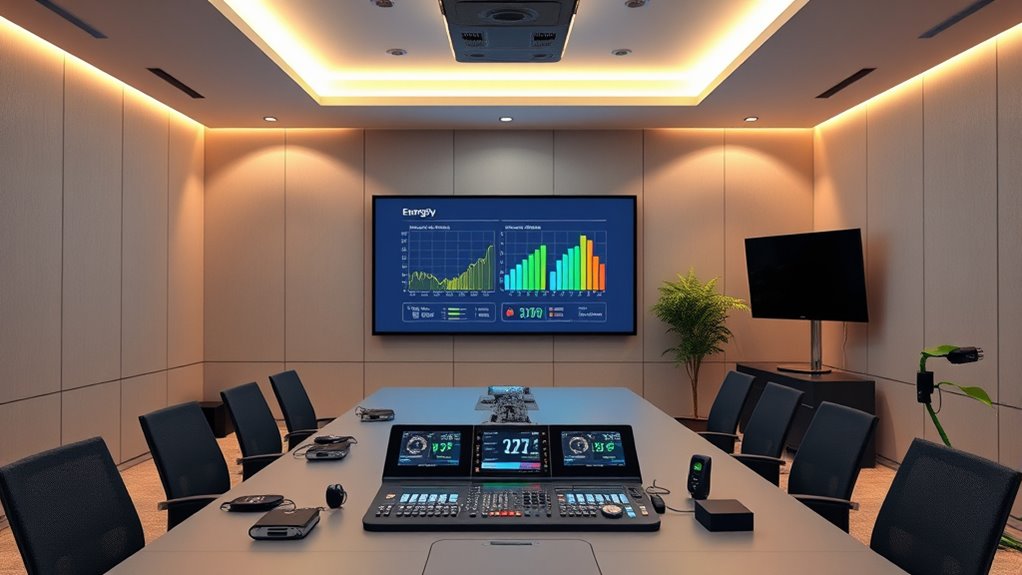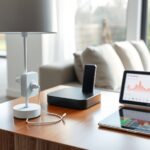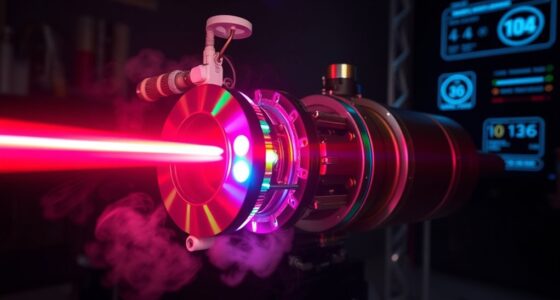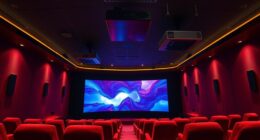Smart energy management for AV systems involves optimizing device performance by choosing the right power sources, using intelligent power controls, and monitoring energy consumption in real time. You can extend battery life, reduce operational costs, and promote sustainable use by scheduling device activity, utilizing low-power modes, and selecting energy-efficient hardware. Implementing these strategies helps prevent overheating and prolongs equipment lifespan. Keep exploring to discover how to implement these techniques effectively and maximize your AV system’s efficiency.
Key Takeaways
- Implement real-time monitoring tools to track and analyze power consumption of AV devices.
- Utilize intelligent scheduling to activate or deactivate hardware during optimal energy use periods.
- Choose energy-efficient hardware components and high-capacity batteries for extended operation.
- Apply low-power standby modes and dim displays to reduce unnecessary energy drain.
- Promote sustainable practices by optimizing energy use to minimize environmental impact and operational costs.
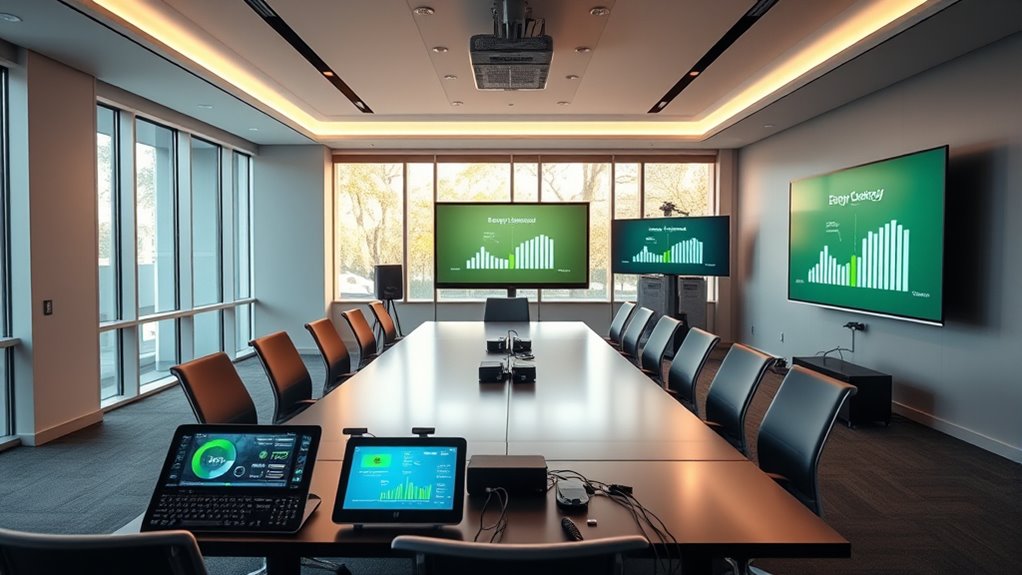
Effective energy management is essential for optimizing the performance and longevity of AV systems. When you focus on battery optimization, you ensure that your devices run efficiently without draining power prematurely. Managing power consumption is key to reducing operational costs and extending the lifespan of your equipment. By paying attention to how your AV system uses energy, you can identify areas where waste occurs and implement strategies to minimize it. This proactive approach helps you keep your system running smoothly during critical events, without interruptions caused by power issues.
Effective energy management extends device lifespan and reduces operational costs through proactive power optimization.
Battery optimization involves more than just choosing the right power source; it requires a keen understanding of how your AV components draw energy. For instance, you can implement intelligent power management features that put devices into low-power standby modes when they’re not actively in use. This not only conserves battery life but also reduces heat generation, which can impact equipment reliability over time. Additionally, using high-quality batteries with higher energy densities ensures longer operational periods between charges, giving you more confidence in your system’s endurance during long events or extended usage.
Monitoring power consumption in real-time is another crucial aspect. Modern AV systems often come equipped with energy management software that provides detailed insights into power usage patterns. With this data, you can identify which devices or modules are consuming the most energy and adjust their settings accordingly. For example, dimming displays or reducing audio output levels when full capacity isn’t necessary can markedly cut down on unnecessary power drain. These adjustments not only save energy but also help prevent overheating and reduce wear and tear on your equipment.
Implementing smart scheduling practices also plays a role in optimizing battery life and power consumption. Turn off or put devices into low-power mode during periods of inactivity, and schedule updates or maintenance tasks during off-peak hours to prevent unnecessary energy use. You should also consider integrating energy-efficient hardware and components designed specifically for low power consumption. These investments can pay off over time by reducing your overall energy footprint and lowering operational expenses.
Furthermore, understanding and managing your energy consumption is vital for sustainable operation and can contribute to your overall environmental impact reduction.
Frequently Asked Questions
How Does Smart Energy Management Impact AV System Lifespan?
Smart energy management extends your AV system’s lifespan by optimizing power use and protecting components. By reducing unnecessary energy consumption, it minimizes stress on batteries, prolonging their lifespan. Power optimization also prevents overheating and power surges, which can damage delicate parts. As a result, your AV system stays reliable longer, saving you money on replacements and repairs. Overall, smart energy management keeps your system efficient and durable over time.
What Are the Initial Costs of Implementing Smart Energy Solutions?
You’ll find that initial costs for smart energy solutions vary based on system size and complexity, typically involving equipment, installation, and integration expenses. Conducting a thorough cost analysis helps you understand upfront investments, while an ROI assessment shows potential savings over time. While these costs might seem high initially, the long-term energy savings and efficiency improvements often justify the investment, making it a smart decision for your AV system.
Can Smart Energy Systems Be Integrated With Existing AV Setups?
Yes, you can integrate smart energy systems with your existing AV setups. These systems often include energy storage and renewable integration, making it easier to optimize power use and reduce costs. By connecting smart controllers to your current AV equipment, you gain real-time energy management, which enhances efficiency. This seamless integration helps you maximize your setup’s performance while supporting sustainable energy practices.
How Do Energy-Efficient AV Systems Influence Overall Operational Costs?
Imagine a well-oiled machine working seamlessly—you’ll notice that energy-efficient AV systems markedly cut your operational costs. By optimizing energy savings, you reduce electricity bills and maintenance expenses, leading to substantial cost reduction. This efficient setup not only benefits your budget but also supports sustainability goals. Embracing energy-efficient AV technology ensures smoother operations and long-term savings, making your investments more valuable and environmentally responsible.
What Are the Best Practices for Monitoring Energy Consumption in AV Systems?
You should regularly perform energy audits and use consumption tracking tools to monitor your AV systems. These practices help identify areas where energy is squandered and enable you to optimize usage. Implement real-time monitoring solutions that provide instant data, so you can make informed adjustments. Consistently reviewing your energy data allows you to improve efficiency, reduce costs, and guarantee your AV systems operate sustainably and effectively over time.
Conclusion
By implementing smart energy management for AV systems, you can markedly reduce energy costs and environmental impact. Did you know that optimized systems can cut energy consumption by up to 30%? Embracing these innovations not only saves money but also supports sustainability goals. As technology advances, staying ahead with intelligent energy solutions becomes essential. So, take action now to maximize efficiency, lower costs, and contribute to a greener future for your AV setups.
